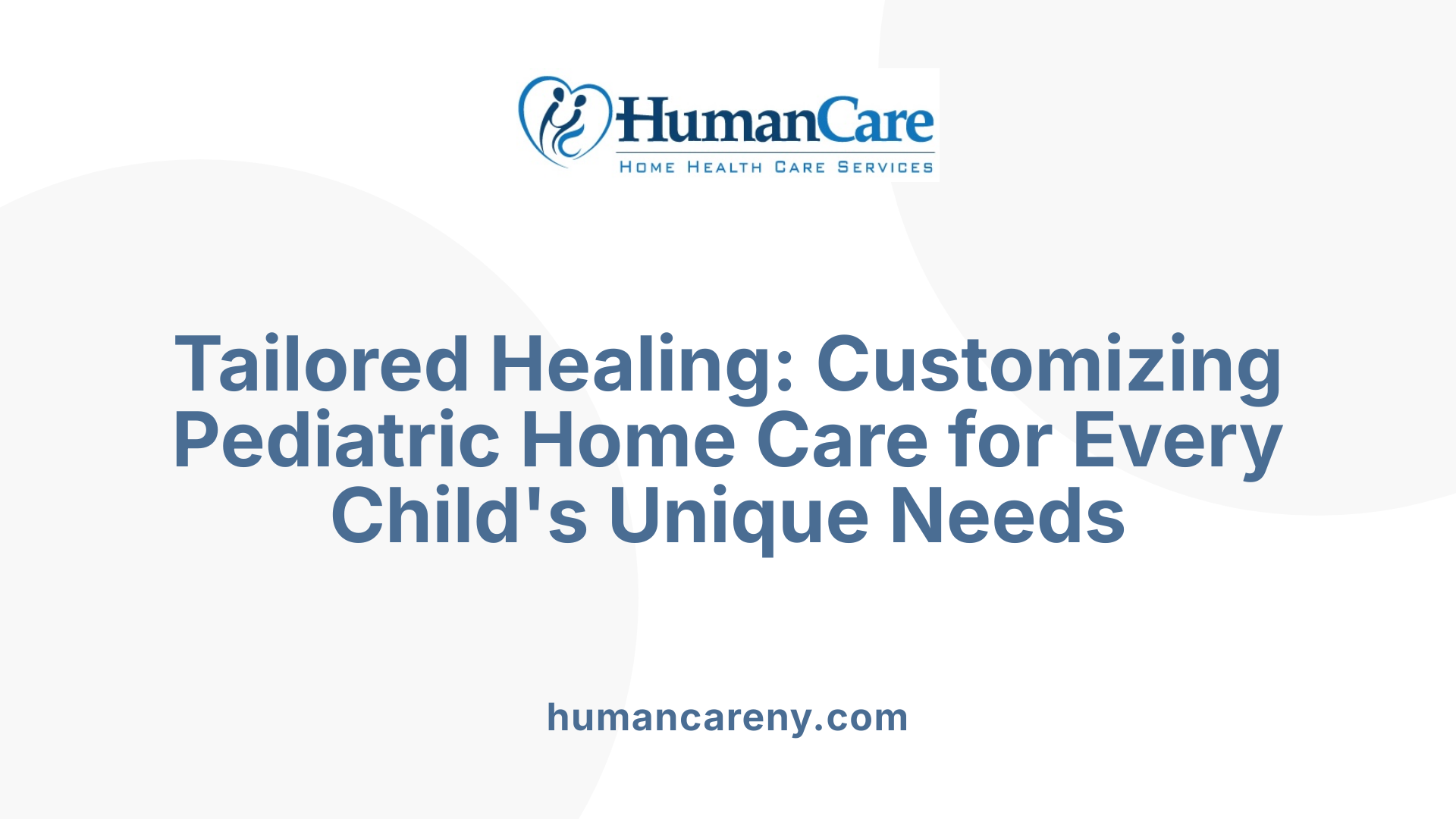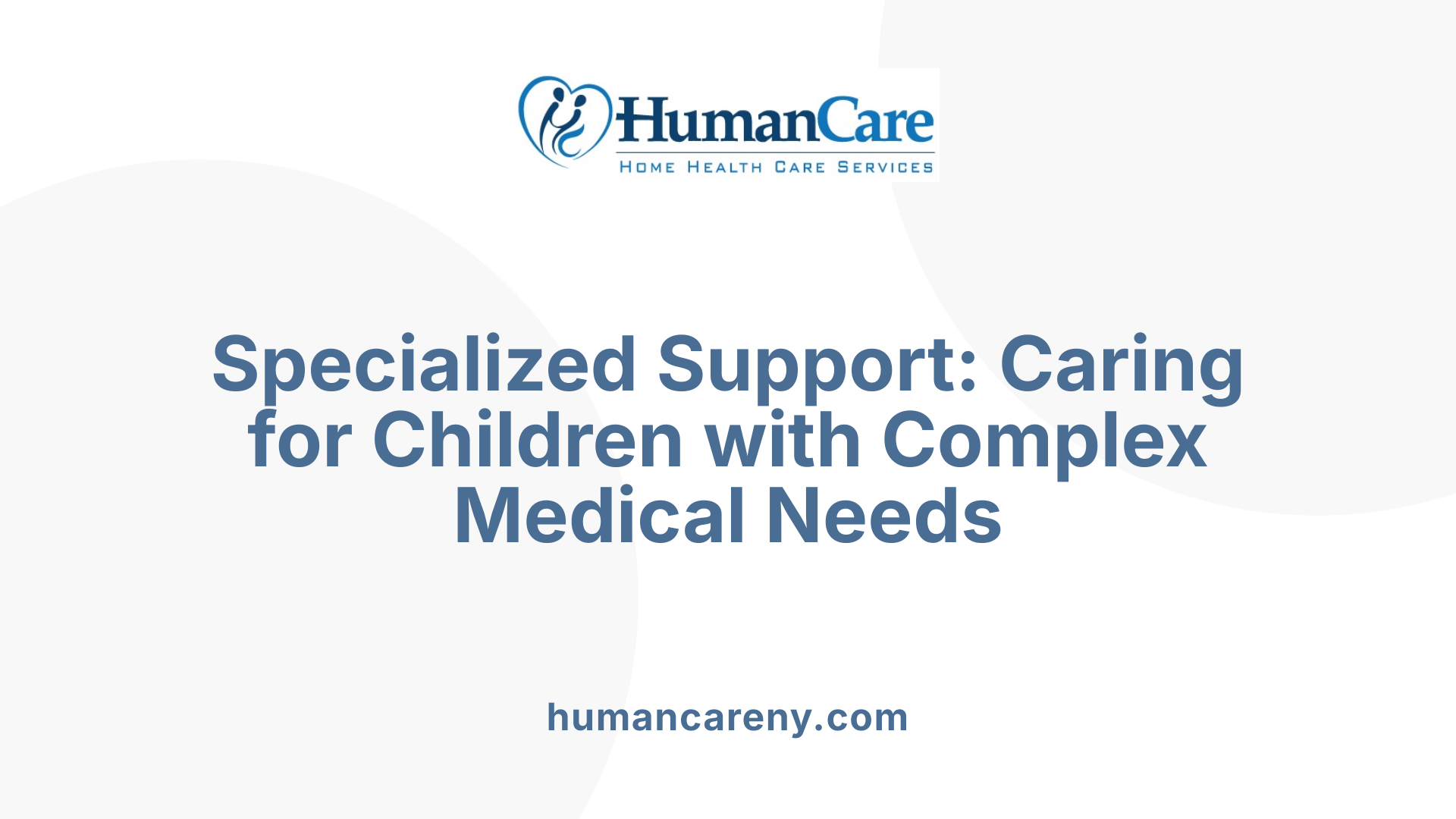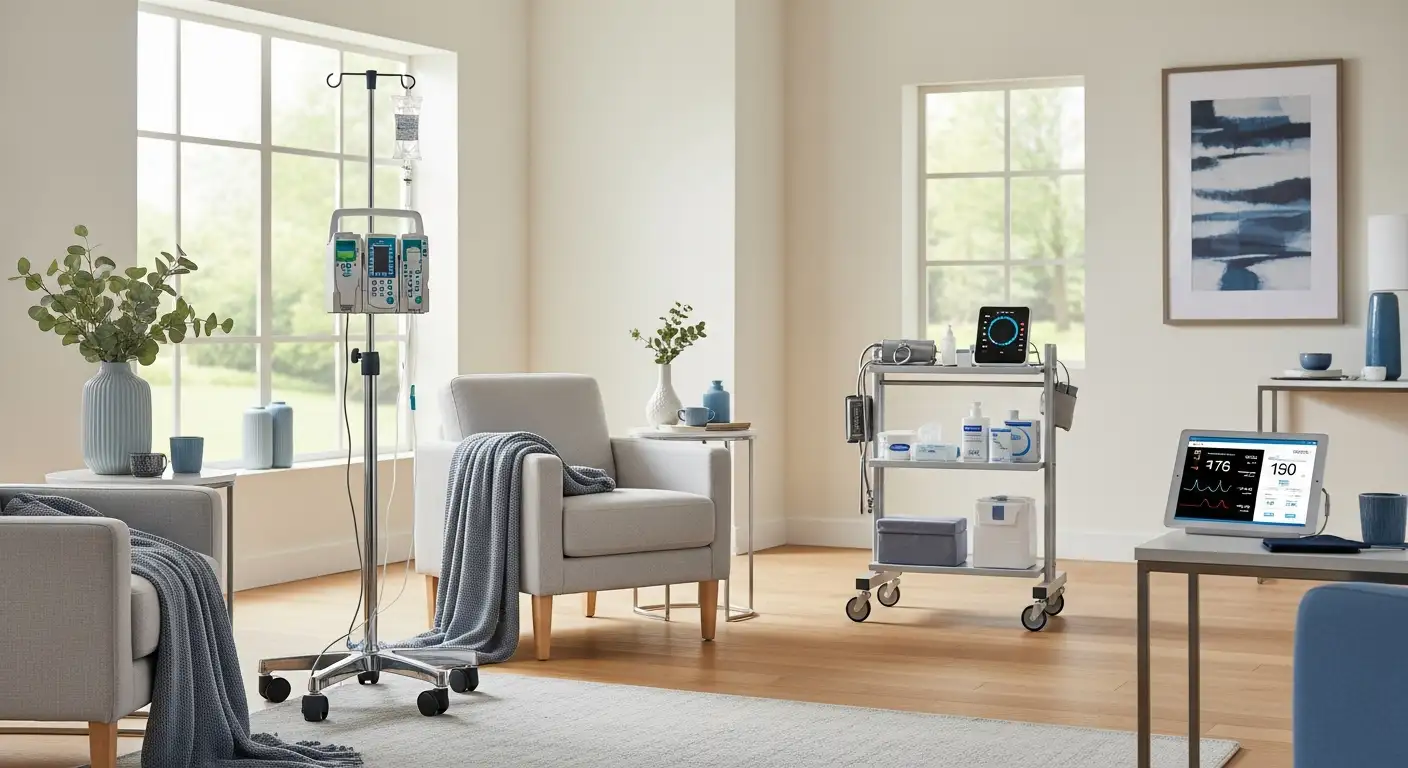Understanding Pediatric Home Health Care
Pediatric home health care delivers specialized medical treatment and support directly in the child's home. This approach is designed to assist children recovering from illness or managing chronic conditions, providing personalized care tailored to their unique needs. Beyond medical benefits, home care dramatically improves the quality of life for children and their families, fostering comfort, stability, and emotional well-being.
Personalized and Comprehensive Care Tailored to the Child’s Needs

What types of conditions are treated in pediatric home health care?
Pediatric home health care supports a wide range of medical conditions. Commonly treated issues include complications from prematurity, cardiac diseases, respiratory illnesses, neurodegenerative and genetic disorders, injuries, cancer, nutritional deficiencies, and asthma. These conditions often require ongoing monitoring and specialized treatments that can be effectively managed at home.
What services does pediatric home health care offer?
Services provided in this setting are diverse and designed to meet complex needs. They include nursing care, occupational therapy, physical therapy, oncology treatments, palliative care, infusion therapy, and neonatal care. This broad spectrum ensures comprehensive support for both recovery and chronic condition management.
How are care plans customized?
Before initiating care, a referral from the child’s doctor is necessary. Once care begins, healthcare providers assess the child’s home environment and medical status to develop individualized care plans. These plans are tailored to address the specific medical requirements and living situations of the child, adapting over time as the child's needs evolve.
What is the role of the healthcare team?
A consistent and multidisciplinary healthcare team delivers care, including nurses and therapists experienced in pediatric needs. This team collaborates closely with the family to provide not only medical treatments but also emotional and practical support.
How does continuity of care benefit the child?
Maintaining continuity with a familiar healthcare team helps ensure consistent monitoring and management of the child’s condition. It fosters trust between families and providers and facilitates early detection of health issues, which is critical for preventing complications and promoting better long-term health outcomes.
| Aspect | Description | Benefits |
|---|---|---|
| Conditions Treated | Prematurity, cardiac, respiratory, neurodegenerative, genetic disorders, cancer, nutritional deficiencies, asthma | Comprehensive care for diverse needs |
| Services Offered | Nursing, OT, PT, oncology, palliative, infusion, neonatal care | Wide-ranging therapies support recovery and chronic care |
| Customized Care Plans | Individualized based on doctor referral and home environment | Effective, evolving care tailored to the child’s condition |
| Healthcare Team Role | Multidisciplinary and consistent | Coordinated care with emotional & practical support |
| Continuity of Care | Ongoing care from the same team | Early issue detection and stronger family-provider trust |
Benefits of Home Care for the Child’s Comfort and Development
How does pediatric home care aid in recovery?
Pediatric home health care supports faster recovery by providing tailored medical treatment in a familiar and comfortable environment. Being at home allows children to heal with improved comfort and reduces the risk of hospital readmissions.
In what ways does home care influence emotional well-being?
Home care reduces stress and anxiety often associated with hospital visits. Being in a loved and familiar space fosters a sense of security and happiness, promoting emotional stability. This environment improves overall quality of life for children with chronic or complex medical conditions.
How does home care affect the child’s daily routines and social life?
Receiving care at home allows children to maintain their usual household routines and family bonds. It enables them to attend school and participate in social activities, preserving a sense of normalcy and encouraging social development.
Can home care help reduce stress in children and families?
Yes, by minimizing disruptions from hospital visits and allowing care to be delivered around the child’s schedule, home care reduces stress for both children and their families. Families also benefit from continuity and personalized care, which alleviates caregiver burden and promotes trust.
What role does home care play in supporting school attendance?
Home-based care offers children the flexibility to continue their education with fewer interruptions. This continuity supports learning and helps children stay connected with peers, which is vital for emotional and social growth.
Enhancing Family Involvement and Reducing Caregiver Stress

How does family participation contribute to pediatric home health care?
Family participation is central to effective pediatric home health care. When families actively engage in their child's care, they enhance their understanding of medical needs and treatment protocols. This involvement not only ensures that care plans are followed accurately but also strengthens trust between families and healthcare providers. Personalized care tailored to the child’s needs encourages collaboration, improving monitoring and early detection of potential health issues.
What roles do family caregivers play in managing pediatric home health care?
Family caregivers often become specialists in managing complex medical tasks such as administering nutrition (e.g., total parenteral nutrition), operating medical equipment, and providing continuous support for chronic conditions. Their lived experience makes them invaluable advocates and expert caregivers. They frequently coordinate communication between multiple healthcare providers, ensuring care continuity and consistency.
How does pediatric home health care help reduce caregiver stress and burnout?
By providing trained professionals to deliver specialized medical care at home, pediatric home care alleviates the physical and emotional burden on families. This support allows caregivers to have time for self-care, reduces interruptions to employment and social life, and lowers the exhaustive demands of continuous monitoring. Home care services foster peace of mind by ensuring safety and effective care even when family members must be away.
In what ways does home health care strengthen family bonds?
Maintaining routine family interactions and household normalcy while receiving care at home fosters emotional well-being for both children and caregivers. Children benefit from the comfort of a familiar environment, attending school and spending time with loved ones, which supports their happiness and stability. Families experience enhanced cohesion as they provide care together within their own space.
What is the importance of the family-centered care model in pediatric home health?
The family-centered care model prioritizes partnerships between families and healthcare professionals. It recognizes families as experts in their child’s needs and emphasizes respectful, individualized care. This model supports collaborative decision-making, acknowledges family caregivers’ contributions, and promotes policies that integrate their voices in care planning. Despite challenges such as fragmented care coordination and insurance barriers, this approach remains fundamental to improving outcomes and supporting caregiver well-being.
Economic and Practical Advantages of Pediatric Home Health Care

Cost Savings Compared to Hospital Care
Pediatric home health care significantly reduces healthcare expenses by decreasing the need for prolonged hospital stays and emergency room visits. Families benefit from lower out-of-pocket costs, making home care a more affordable option for ongoing treatment.
Insurance Challenges and Coverage Issues
Despite these savings, many families face insurance denials or coverage limitations. Administrative errors and misclassification of services often leave families responsible for high medical expenses, highlighting a gap in insurance support for specialized home care.
Logistical Ease and Flexibility
Home-based services offer flexible scheduling that fits around daily routines, enabling children to maintain school attendance and participate in social activities uninterrupted. This flexibility decreases travel time and logistical stress for families.
Use of Telehealth and Technology
Advancements in telehealth and medical technology enhance the safety and monitoring of children receiving care at home. These tools facilitate timely interventions and continuous treatment without the need for frequent hospital visits.
Management of Medical Equipment at Home
Trained professionals in pediatric home health care efficiently manage complex medical equipment such as ventilators and feeding tubes. This support improves treatment outcomes and alleviates families' burden of handling specialized devices independently.
Supporting Children with Medical Complexity and Specialized Needs

Care for Children with Medical Complexity
Children with medical complexity (CMC) often require intensive, ongoing health services and specialized technology to maintain their well-being. These children frequently need private duty nursing, rehabilitative therapies, and customized home modifications to manage their complex medical needs effectively. Providing home health care in familiar surroundings not only supports better health but also enhances their quality of life.
Specialized Therapies and Technology Use
Pediatric home health care for CMC includes access to specialized therapies such as physical, occupational, and speech therapy directly at home. This ensures comprehensive care tailored to each child's unique needs. Additionally, the use of medical technologies — including ventilators, feeding tubes, and telehealth tools — improves monitoring, safety, and treatment quality, allowing timely interventions and reducing hospital visits.
Guidelines from Professional Organizations
Leading authorities like the American Academy of Pediatrics advocate for home-based care as ideal for children with medical complexity. These guidelines emphasize family-centered care, comprehensive support, and the importance of integrating services in the child's home environment to optimize health outcomes and promote stability.
Improving Health Outcomes for Complex Cases
Home healthcare services for CMC improve health by increasing participation in daily and school activities and preventing hospital readmissions through early detection and continuous monitoring. The presence of a consistent healthcare team allows for ongoing management of chronic conditions and timely adjustments, enhancing long-term outcomes.
Importance of Qualified Home Health Providers
Trained and skilled home healthcare professionals play a critical role in managing emergencies and specialized medical needs specific to CMC. Their expertise ensures personalized, consistent care plans that evolve with the child’s condition. High-quality home care not only supports children’s medical and emotional needs but also provides essential relief and support for families coping with complex caregiving demands.
Challenges and Barriers Facing Families Receiving Home Health Care

What insurance and coverage challenges do families face in pediatric home health care?
Families of children requiring specialized home care often encounter insurance denials and gaps in coverage. These issues arise due to administrative errors or misclassification, leaving many families with significant out-of-pocket expenses. Such financial burdens limit access to necessary care and strain family resources.
How do workforce shortages and variability in training impact home health services?
A shortage of qualified home care providers creates barriers to timely and effective service. Additionally, variability in provider training can lead to inconsistent care quality. Adequately trained professionals are essential for managing complex medical needs, and workforce limitations hamper this capability.
What social determinants affect access to pediatric home health care?
Social factors like income level, language barriers, and geographic location significantly influence accessibility. Families from lower-income backgrounds or non-English speakers often face added challenges in obtaining services, deepening health disparities.
Why is care coordination a difficulty for families?
Care coordination is frequently fragmented, forcing families to act as the central communicators among numerous healthcare providers. This role is demanding and often unsupported, increasing caregiver stress and risking gaps in treatment continuity.
What roles do families play in advocacy and navigation?
Families become specialists in their child's medical care and advocacy due to lived experience. They navigate complex healthcare systems, often without formal recognition or adequate support, and rely on peer networks such as Family-to-Family Health Information Centers for guidance.
This combination of insurance complications, provider shortages, social obstacles, coordination issues, and reliance on family advocacy creates substantial challenges for children and caregivers seeking home health care.
| Barrier Category | Description | Impact on Families |
|---|---|---|
| Insurance Coverage | Denials, administrative errors, and coverage gaps | High out-of-pocket costs, limited service access |
| Workforce Limitations | Shortage and inconsistent training of home care professionals | Delays in care, variable treatment quality |
| Social Determinants | Income level, language barriers, and geographic disparities | Reduced accessibility and increased health inequities |
| Care Coordination | Fragmented services requiring families to manage communication | Increased caregiver burden, risk of treatment lapses |
| Family Advocacy and Support | Families as primary advocates navigating complex systems without formal recognition | Emotional strain but essential for care continuity |
The Role of Family Expertise and Advocacy in Shaping Care

Families as Primary Drivers of Home Care Services
Families of children with special health care needs are essential in managing and driving home- and community-based services. Their close involvement makes them specialists in medical care, advocacy, and public health because of their lived experience, allowing them to provide personalized, day-to-day support that formal services alone cannot offer.
Family Expertise in Medical and Advocacy Roles
Beyond typical caregiving, families often perform complex medical tasks such as preparing and administering total parenteral nutrition (TPN), especially when licensed home health professionals are not always available. They also advocate tirelessly for their child's needs with healthcare providers and policymakers.
Integration of Family-Centered Models
Decades of policy changes have moved care towards family-centered models, emphasizing partnerships between families and professionals. However, many families still feel invisible and undervalued despite their critical role. They face challenges including a lack of providers, poor care coordination, and difficulties with insurance coverage.
Peer Support and Family-to-Family Health Information Centers
Peer support services like Family-to-Family Health Information Centers offer vital assistance by providing guidance, advocacy, and resources to families. These centers help families navigate the healthcare system and connect with others facing similar challenges.
Importance of Recognizing Family Contributions
Recognizing the extensive, complex care families provide is crucial. Their efforts often exceed what is formally reimbursed or acknowledged, amounting to billions of dollars in value annually. Properly supporting and valuing family caregivers strengthens care coordination and improves health outcomes for children with special health care needs.
The Future of Pediatric Home Health Care: Empowering Families and Improving Lives
Pediatric home health care stands as a vital component in nurturing the health and happiness of children with complex medical needs. Its family-centered approach ensures that care is not only medically effective but also emotionally supportive, reducing stress for children and caregivers alike. Despite existing challenges such as insurance obstacles and workforce limitations, ongoing efforts to improve service quality and accessibility promise a future where families are recognized as essential partners in care. Embracing and expanding pediatric home health care will continue to enhance the lives of countless children and strengthen the very fabric of their families, ultimately fostering resilience, stability, and hope.



